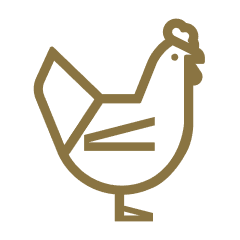The aim of profitable animal production
Healthy animals have optimal live performance and little need for veterinary interventions. As a consequence, the aim of animal rearing is to maintain them as healthy as possible for the highest return of the investment. There are multiple approaches to reach this ambitious goal: the first tool is good nutrition. It is important to correctly balance the nutrients intake to meet animal requirements during each phase of their productive life. At the same time, there is the need to prevent intestinal damages and to help the animals when challenges arise. The intestine is the first body defense and its barrier is a complex structure composed of different players:
- The mucus layer: Goblet cells produce and secrete in the lumen mucin glycoproteins as a non-selective barrier against pathogens;
- The epithelium: a cellular monolayer composed of both enterocytes and Goblet cells. Between cells there are intra- and inter-cellular protein structures, the tight junctions, that protect the organism from the uncontrolled passage of molecules and pathogens;
- The gut-associated lymphoid tissue (GALT): immune system cells always ready to face pathogens that escape the control of other structures.
Pathogens and parasites are surely dangerous for intestinal health, damaging the mucosa integrity and selective function. On the other hand, even physiological phases of animal life are particularly hazardous for the intestinal barrier function. As mammals experience weaning, birds have an equally stressful period after hatching: the diet changes (from the yolk to the solid feed) as well as the environment. Unavoidably, the intestine is affected by this physiological transition, even without clear clinical signs. Another common and stressful period is summer: it is well proved that high temperatures and heat stress affect not only the animal feed intake but also the intestinal mucosa integrity. The results of these conditions are the reduction in barrier function, with an uncontrolled passage of toxins and pathogens as well as an unbalanced nutrient absorption from the ingesta. What can we do to prevent or reduce these damages, if we cannot avoid stressful periods?
Nature comes to our aid
There are different molecules that Nature gives to us to face this important problem. The first category, already widely used in animal nutrition, is organic acids. Animals have no specific requirements for these molecules and they pass the stomach only in small quantities, but they can be really useful at the intestinal level. It is well known the antimicrobial activity of organic acids and this is among the reasons for their dietary inclusion. Once into the bacterial cell, the molecule has both bacteriostatic and bactericidal activity against the so-called pH-sensitive bacteria, so against the vast majority of pathogens.
The second interesting category includes phenolic compounds present in plant extracts and essential oils as complex mixtures with no standard concentrations among different molecules. Many of these compounds have a strong antimicrobial activity because they are able to create pores into the pathogens cell membrane, leading to the loss of cytoplasm and cell death. Due to their mode of action, they are commonly named pore-forming agents.
It is demonstrated that the combination of organic acids and pore-forming agents have a synergistic antimicrobial activity: their combination can significantly reduce pathogens growth by using lower molecule concentration than the single one and they have good results even against some antibiotic-resistant pathogens (i.e E. coli, C. perfringens, E. cecorum).
The synergy among these molecules is not only related to the antimicrobial but also to their anti-inflammatory activity on the intestinal mucosa. Studies demonstrated that their combination improves the barrier function, increasing the tight junction protein expression and reducing the uncontrolled passage of molecules between the enterocytes. Even after an inflammatory challenge with the disruption of mucosa integrity, the addition of these combined molecules restored (and even improved) the physiological barrier function.
How can we use these tools?
Organic acids and nature identical compounds are really powerful molecules but they have a problem: once ingested, they hardly pass the stomach. At the same time, at the intestinal level, they must be simultaneously released at the same point in order to exploit their synergistic activity. AviPlus® can overcome these problems: both organic acids (citric and sorbic) and nature identical compounds (thymol and vanillin) are protected by a vegetable lipid matrix and they are contained together in each microbead of the product. AviPlus® microencapsulation technology and the granulometry distribution specifically studied for the target animal species, ensure the bypass of the stomach and the release of the active ingredients along the whole intestinal tract of the animal. The lipid matrix is attached by lipases and starts releasing the active ingredients. The product is composed of beadlets with different particle sizes so that the smallest will be degraded in the upper intestine and the largest reach the hindgut and release both organic acids and nature identical compound into the ceca. Numbers of in-field experimentations confirmed that the balanced combination of sorbic and citric acids with thymol and vanillin through Vetagro technology can be extremely useful in preventing and restoring poultry intestinal health, leading to better general health and improved life performance.For more information: marketing@vetagro.com









